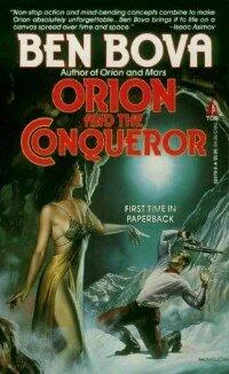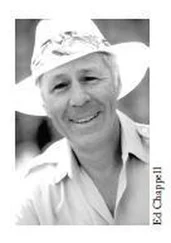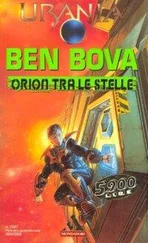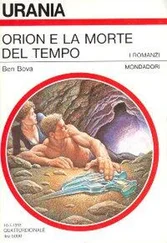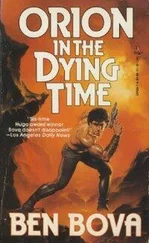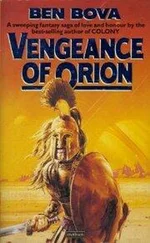“And his strength.” I turned back to Harkan. His spear had not wavered a millimeter from my heart. “Go ahead, my friend. Do it and get it over with.”
He hesitated.
“For your children,” I told him.
Harkan took a deep breath, then plunged the spear into my chest with all his might. I felt no pain at all. Just darkness engulfing me, welcome, blessed nothingness.
I died.
This time death was like being in the center of a whirlpool, inside the heart of a roaring tornado. The universe spun madly, time and space whirling into a dizzying blur, planets and stars and atoms and electrons racing in wild orbits with me in the middle of it all, falling, falling endlessly into a cryogenically cold oblivion.
Gradually all sensation left me. It might have taken moments or millennia; I had no way to gauge time, but all feeling of motion and cold seeped away from me, as if I were being numbed, frozen, turned into an immobile, insensate block of ice.
Still my mind continued to function. I knew I was being translated across spacetime, from one cusp of the continuum to another. Yet for all I could see or touch or hear, I was in total oblivion. For a measureless time I almost felt glad to be free of the wheel of life at last, beyond pain, beyond desire, beyond the agonizing duty that the Creators forced upon me.
Beyond love.
That stirred me. Somewhere in the vast reaches of spacetime Anya was struggling against forces that I could not even comprehend, in danger despite her godlike powers, facing enemies that frightened even the Golden One and the other Creators.
I reached out with my mind, seeking to penetrate the blank darkness that engulfed me. Nothing. It was if there were no universe, no continuum, neither time nor space. But I knew that somewhere, sometime, she existed. She had loved me as I had loved her. Nothing in all the universes of existence would keep us apart.
A glimmer of light. So faint and distant that at first I thought it might be merely my imagination obeying my desire. But yes, it truly was there. A faintest, faintest glow. Light. Warmth.
Whether I moved to it or it moved to me mattered not at all to me. The glow grew and brightened until I seemed to be hurtling toward it like a chip thrown into a furnace, like a meteor drawn to a star. The light blazed like the sun now and I threw my arms across my eyes to ease the pain, delighted that I had eyes and arms and could feel again.
“Orion,” came a voice from that blinding, overpowering radiance. “You have returned.”
It was Aten, of course, the Golden One. He resolved his presence into human form, a powerful godlike figure with thick golden mane, robed in shimmering gold, almost too bright for me to look upon.
He stood before me in an utterly barren landscape that stretched toward infinity in every direction: a featureless plain of billowing mist that played about our ankles, an empty bowl of sky above us the color of hammered copper.
“Where is Anya?” I asked.
“Far from here.”
“I must go to her. She is in great danger.”
“So are we all, Orion.”
“I don’t care about you or the others. It is Anya I care for.”
A faint hint of a smirk curled the corners of his lips. “What you care or don’t care about is inconsequential, Orion. I created you to do my bidding.”
“I want to be with Anya.”
“Impossible. There are other tasks for you to perform, creature.”
I stared into his golden eyes and knew that he had the power to send me where he chose. But I had powers, too, powers that were growing and strengthening.
“I will find her,” I said.
He laughed scornfully. But I knew that whatever he did, wherever he sent me, I would seek the woman I loved, the goddess who loved me. And I would not cease until I found her.
While this continuation of the tale of Orion’s struggles with his Creators is of course fiction, the details of fourth-century B.C. history are as accurate as I could make them. Throughout the novel I have used the Greek-style spellings for proper names, a practice that sometimes drives my copyeditors to despair.
Since I first read about Alexander the Great, when I was a child, I have been more interested in his father than in Alexander himself. And I think there are important lessons to be pondered in the story of Philip’s life.
Without Philip there could have been no Alexander the Great. Philip II welded a dispirited and divided Macedonia into the first true nation-state of Europe. By force of arms, at first, but increasingly by diplomacy and clever use of military leverage, Philip made Macedonia supreme among the Greek city-states of the Fourth Century B.C. He was not merely a great general; he became a great statesman. He learned and grew during the course of his relatively short, arduous, painful life.
The struggle between ancient Athens and Philip’s Macedonia has been painted by most historians as a contest between democracy and tyranny. So it was, although Athenian democracy was limited to free males born in the city, and Philip was not a tyrant in the modern, pejorative sense of the word. His authority had its limits.
For us, who have lived through a bitter Cold War and seen the collapse of the superpower that opposed us, it may seem uncomfortable to consider the parallels between fourth-century (B.C.) Athens and twentieth-century (A.D.) America. The city-state of Athens was overflowing with lawyers. Most of the great speeches that have come down to us over the intervening centuries were actually speeches made by lawyers who were trying to sway the Athenian council. In a sense, lawyers such as Demosthenes were the “media stars” of the day. They deliberately used every oratorical trick they knew to sway the crowds who came to listen to them.
Thus Athenian policy was often guided by bursts of emotion rather than carefully-reckoned reality, a danger that lurks in the shadows of every democracy—including our own. Athens was not conquered by Macedonia so much as made trivial by the growth of a new kind of nation-state. Eventually both Macedonia and Athens fell prey to the growing power of the Roman Empire. Could American democracy be cast aside, made trivial by new forms of corporate or governmental power? While our lawyers sue one another, are there Philips and Alexanders and Romans out there in other lands changing the very ground on which we stand?
For his part, Philip was a master of military might and diplomatic skill. Had a man of his caliber been running the Kremlin for the past twenty-some years, the Cold War might very well have been decided against us.
The problem with tyrants, though, even benevolent tyrants, is the problem of succession. Democracies, whatever other faults they may have, almost invariably produce peaceful changes of leadership. With kings and dictators, change usually means bloodshed. It was by no means certain that Alexander would automatically succeed his father to the Macedonian throne. He was young, and known to be impetuous. Philip had started a new family, formally divorcing Olympias and thereby placing Alexander’s legitimacy in some doubt. Philip’s assassination placed Alexander on the throne, and to this day most historians believe that if Alexander took no active part in the murder, he very probably knew of it and took no steps to prevent it.
Olympias stood at the center of these events, working with all her powers to assure that her son would succeed to the throne. That is what primate mothers do, whether they are chimpanzees or goddesses.
As soon as Alexander was accepted as king of the Macedonians, the tribes to the north and west rebelled, as they always did when a new king took the throne. Alexander spent a year quelling their desire for independence. Twenty-three centuries later, those Balkan tribes are still fighting among themselves.
Читать дальше
